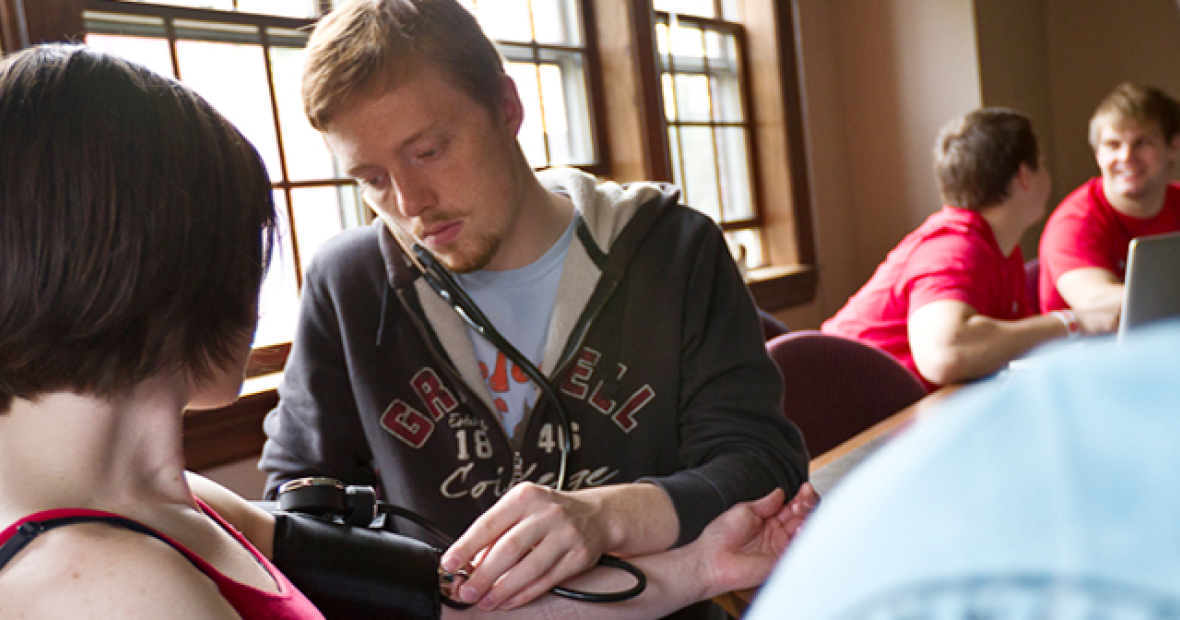Liberal Arts in Health Care
Students interested in traditional and nontraditional healthcare careers need to know how to make the most of their liberal arts experience. Matthew Croco ’97 an orthodontist with his own practice in Coralville, Iowa, suggested successful alumni return to campus to discuss postgraduate options with students who want to work in health care.
The Office of Development and Alumni Relations and Center for Careers, Life, and Service (CLS) are co-sponsoring the Liberal Arts in Health Care Professions Symposium this weekend, with two panels of alumni working in the medical field. Students can also call the CLS to arrange 30-minute appointments with individual alumni for the morning or afternoon of Saturday, Feb. 8.
Two recent alumni weigh in on how Grinnell prepared them for their health services careers and how to get the most out of a Grinnell education.
Rania Robb ’03, Child Life Specialist
From a very young age, Rania Robb ’03 has been interested in working with children in a medical setting. With a predilection for science, she assumed that she would be a pediatrician or a pediatric surgeon. Instead she decided to become a child-life specialist, and wouldn’t have it any other way.
After majoring in chemistry at Grinnell, Robb decided going to medical school wasn’t a path she saw herself taking. Instead, she completed a few additional classes and a child life internship at a Houston hospital, and passed the exam to become a certified child-life specialist.
Working in Mercy Medical Center’s Neonatal Intensive Care Unit (NICU) in Des Moines, Robb advocates for infants and their families while the babies are in the hospital. She minimizes stress and pain for the infants, gives them developmental support, and prepares older siblings to visit their new family members. She also provides positive touch for infants, countering the common negative association that results from the poking and prodding they experience often and early in life.
Child life marries the scientific and emotional elements of healthcare. Although many are drawn to the profession by the emotional, caring element, Robb brings an analytical approach that allows her to glean as much as possible from scientific papers, appreciating the methodology as well as the results.
Tyson Stock ’09, Doctor of Osteopathy
Tyson Stock ’09 sometimes still wishes that he had chosen a less-traditional major at Grinnell. He double-majored in biology and Spanish, but felt like he missed out on a lot of other academic opportunities.
“Medical school prerequisites take a substantial chunk of your courses as an undergrad,” he said. Looking back, he wishes he had earned a single major, in his case Spanish, using the extra the time for courses like “music, theater, psychology, sociology, statistics, religious studies, and on and on.” He believes now — as he was told during his time at Grinnell — that it’s important to cast as wide a net as possible to learn about the world through many perspectives.
Stock knows having different experiences and perspectives helps medical students because there is so much more to medicine than just science. “You have to be able to communicate well, both verbally and in writing. You have to understand the psychosocial aspects of your patients to best care for them. You have to be efficient on a computer, with electronic medical record documentation taking up a large part of your day. You have to be creative from a business perspective. And most importantly, you have to always be asking ‘why,’" he says. Of the many lessons he learned at Grinnell, the most significant was to ask why, to question methods, evidence, and treatments.
Stock, a doctor of osteopathic medicine, is currently interning at a family medicine program near Chicago. The founder of osteopathic medicine, Andrew Taylor Still, stressed “mind, body, spirit” in the late 1800s, when rank-and-file doctors still treated patients with arsenic and viewed cocaine as an addiction-free panacea.
“I really enjoyed the idea of ‘mind, body, spirit’ and of treating the patient as a whole, because it was a great continuation of a lot of things I learned at Grinnell.” says Stock.

